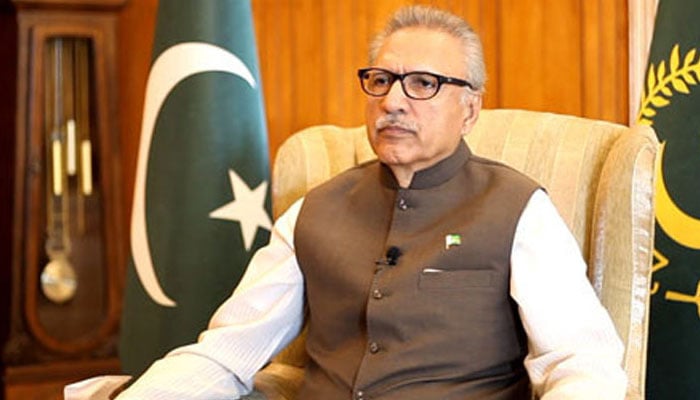President Alvi returns NAB bill unsigned again
Alvi says bill sends a message to corrupt that they are not accountable and are free to continue to plunder
ISLAMABAD: President Dr Arif Alvi on Monday returned the National Accountability (Amendment) Bill 2022 unsigned again to the PM Office, saying that he believes the bill is regressive in nature and will promote corruption by ensuring that the long-arm of the law is crippled.
Earlier on June 4, for "not being informed" about the “legislative proposal” under Article 46 before the electoral and the NAB amendment bills were tabled in Parliament, President Dr Arif Alvi refused to sign them and returned them back to PM Shehbaz Sharif.
The president had returned the NAB (Amendment) Bill, 2022 and Elections (Amendment) Bill, 2022 for “reconsideration and detailed deliberation” to Parliament and its committees under Clause (1) (b) of Article 75.
The said bills were then passed by a joint sitting of the parliament on June 09 and will come into force despite the president’s refusal to sign them.
A press release issued by the President House today said that the bill also sends a message to the corrupt, who have amassed tremendous wealth and about which there is no doubt in the minds of the people of Pakistan, that they are not accountable and are free to continue to plunder.
‘Bill against fundamentals of Constitution’
Raising objections over the bill, the president said "small man will be caught for petty crimes while the corrupt rich will remain free to continue with their blood-sucking abhorrent practices". Having weak accountability is against the basic right of the people of Pakistan who are the suffering masses, and, therefore, it is also against the fundamentals of the Constitution, he added
He said that he was aware of the fact and in view of the ‘deeming’ provision under Article 75 (2) of the Constitution of Pakistan, the bill will be enacted into law even if the president of Pakistan does not sign the bill.
While elaborating his reasons for not signing the bill, President Alvi said that the world has struggled to control white-collar crime. Black money, acquired through tax evasion or through other avenues of crime and corruption, especially by politically exposed persons, does not leave easy tracks or a trail that can be followed. The exercise undertaken under the Financial Action Task Force (FATF) itself is an example of decades-long efforts to block all avenues of money laundering.
The president said that this was where the country should take inspiration from Islam and referred to an incident frequently related to Caliph Hazrat Umar (RA), who was asked to explain how he acquired two pieces of cloth used in the cloak he was wearing, instead of the one everybody was given. And because he had it in his possession, he explained the source.
The president said that this incident laid down two fundamental principles of accountability; one, that the onus of the prosecution or the accuser was to make sure that the item, in this case, an extra piece of cloth, was in the possession of the person (Hazrat Umar RA), and second, that the onus to justify the source of the item (wealth) was upon the accused.
‘Principle of justice abolished in NAB ordinance’
While further elaborating his reasons for not signing the bill, the president said that the principle of justice for all crimes is that a person is presumed innocent until proven guilty. The exception is that the accused must present a money trail, for example, where and how did he get an extra piece of cloth, any property, or wealth that is in his possession.
The onus of the prosecution was to prove possession and that of the accused was to show the money trail. The possession of unexplained wealth was a crime in Pakistan until these amendments which have diluted the concept, making it substantially ineffective, he added.
The President said that as has been observed by the superior Judiciary, reflecting the general perceptions, that unfortunately, there were flaws in the implementation of the NAB Ordinance. This law, like all other laws vesting authority in the executive, was abused for political exigencies by those in power. Because of this reason, along with the role of vested interests, the accountability process in Pakistan became quite ineffective.
He said that it was sad that rather than structurally improving the institution, the enactment of these amendments is like demolishing the process of accountability without an alternate system being in place, making it sterile and allowing extractive institutions and practices to prosper.
Alvi added that weak laws, such as this one, create a facade of justice that blatantly hides a corrupt elite capture, and nations that accommodate such laws ensure very damaging exploitation of the common man perpetuating an unjust society.
‘My conscience does not allow me to sign this bill’
“We must act upon the injunctions of the Quran and Sunnah, and above all, I am answerable to Allah and ask for His forgiveness,” the president said adding that therefore, he painfully states, that his conscience does not allow him to sign this bill.
-
Security forces gun down 30 terrorists in multiple IBOs in KP: ISPR
-
MQM-P calls for new province in Sindh
-
US report validates Pakistan military edge over India: PM
-
Banned TTP poses serious threat to Pakistan security: UNSC panel
-
CM Afridi clarifies remarks on by-poll after ECP requests army deployment
-
Dubai sees 3.2m Pakistani passengers in 2025 as airport sets new milestone
-
Security forces kill 23 Indian proxy terrorists in KP's Kurram
-
Pakistan to construct island to boost oil exploration: report












